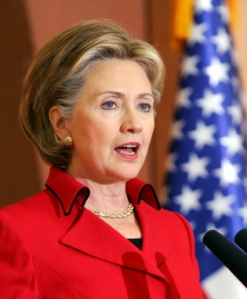On this International Women’s Day, IWPR recognizes the valuable contributions that former Secretary of State Hillary Clinton has made to the encouragement of research and data collection on women and girls around the world. While in office, Clinton characterized improving the rights and status of women as “essential to our shared prosperity and security.”
Hillary Clinton’s time as Secretary of State will have lasting impacts on the status of women and girls throughout the world. Her efforts expanded the State Department’s agenda to include women and girls through program implementation and data collection. For example, in 2012, Secretary Clinton helped launch the Equal Futures Partnership, with support from 12 founding nations, with the goal of further engaging women in public life as leaders and beneficiaries of economic growth.
In a world increasingly focused on data and the implications of numerical results for international development Secretary Clinton called for an increase in research focusing on women and girls, pointing out that national economies thrive when women thrive—promoting peace and prosperity.
Organizations such as IWPR continue to collect valuable data on the status of women and girls. IWPR’s Status of Women in the Middle East and North Africa project conducted with the International Foundation for Electoral Systems (IFES) in partnership with regional organizations, explores the status of women in Morocco, Yemen, and Lebanon. The project also aims to encourage local NGOs to collect and disseminate their own data and research on the status of women and girls in order to better inform public policy. With funding from the Canadian International Development Agency, IWPR and IFES produced a toolkit that serves as a guide to the collection, analysis, and promotion of reports on the status of women.
As part of the project, IWPR and IFES conducted original surveys in the Middle East and North Africa. Analyses of the data include topic briefs on women’s civic participation in Morocco, women’s freedom of movement in Yemen, and attitudes toward women’s economic independence in Lebanon. These data respond to the call from Secretary Clinton for more and better research to improve policy and practice.
In a world facing a “data revolution” the importance of compiling and putting data to work for women has become paramount. As Secretary Clinton asserted, we cannot simply rely on moral arguments in the fight for gender equality; data analysis and gathering are essential to the task of accurately representing the lives of women worldwide.
At a Gallup conference on data collection, Secretary Clinton said “We keep statistics on everything we care about, from RBIs to ROI, the daily ups and downs of the Dow and our bank accounts. So if we’re serious about narrowing the gender gap and helping more girls and women, then we must get serious about gathering and analyzing the data that tell the tale.”
During her tenure, Secretary Clinton reinvigorated America’s global representation by meeting government officials around the world, travelling over one million miles to 112 countries. But aside from miles logged, her most lasting advances may well be in ensuring that research and data collection on women and girls remain at the forefront of foreign policy priorities. The increased emphasis on data collection has provided a platform for the many organizations that focus on the collection of data on women and girls. IWPR is working with other institutions to develop research to respond to the need both for data and for regional organizations to build their capacity to improve the conditions women and girls face.
Secretary Clinton’s ascent to public office has been remarkable and notable, perhaps most so because she is female. Women are still highly outnumbered as political leaders in the United States and abroad. A study from IWPR conducted by consultant Denise Baer with the Hunt Alternatives Fund explores the reasons why women do and do not run for higher elective office. Hillary Clinton ran a grueling, and almost successful, campaign for her party’s nomination for the highest office in the United States, President.
On this International Women’s Day, as we look to strengthen and empower women worldwide, we must also begin to look closer to home. With more women leaders taking the stage in the U.S. Congress, on the Supreme Court, and in the executive branch, the United States can proudly join other nations in expanding women’s roles across the globe.
Drew McCormick is currently completing a master’s program at The School for International Training in Washington, DC, and is working as a research intern for IWPR as part of her master’s work. Drew is interested in international development and the role that U.S. foreign policy plays in the lives of women in developing nations.
To view more of IWPR’s research, visit IWPR.org
About the author
- IWPR
- IWPR
- IWPR
- IWPR


